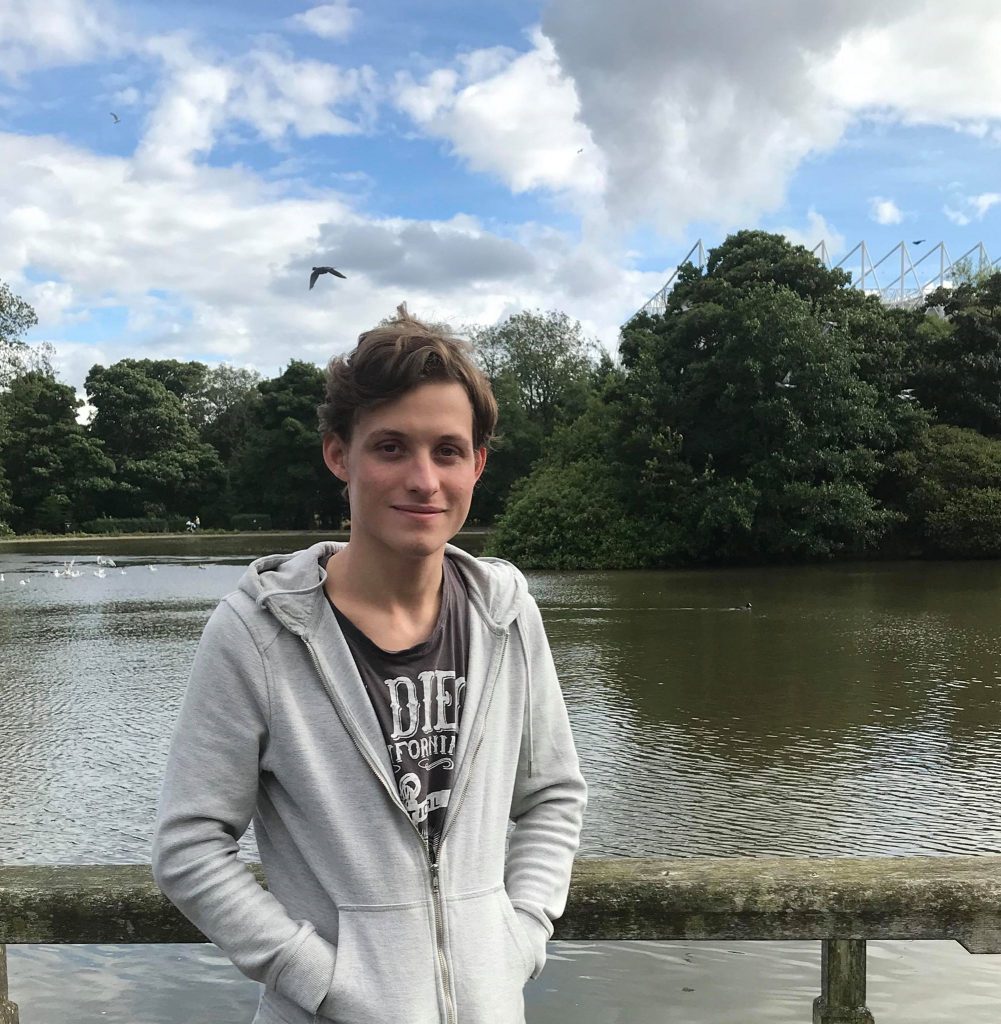
Tell us a little bit about yourself
Originally from Surrey, I moved to Devon at a young age, bouncing between state schools as I did so. Throughout this I’ve always been interested in history. Despite this, I originally wanted to become a Lego designer but then I realised I was rubbish at graphic design (a key skill to say the least), so that path was dropped. I have two siblings, an older sister working to protect animals, and a twin brother who has become a barrister. My interests include videogames, especially story driven ones, climbing, reading (when I get the time to read a fiction book), acting (I played the roles of Claudio from Much Ado About Nothing and The Prince in Into the Woods at university) and theatre! Before I started my PhD I worked as a professional archaeologist, working on sites across the country; the most interesting excavation I attended was a Roman Villa in a small town called Purton. However, eventually my interests changed, in combination with being fed up with the constant rain, and I decided to pursue a different path. Despite this, archaeology still strongly informs my work.
Tell us a little bit about your research
A number of Greek communities across the Hellenistic provide evidence of a fascinating interplay between identity, mythology and material culture whose influence has been critically understudied by recent scholarship. Despite acknowledgment that identity continually evolves, researchers fail to tackle how material culture contributes to this over time and the impact this dynamic had upon the sustainability of community belief in their local, elite manipulated, mythologies. My thesis tackles these questions through employment of case studies across Arcadia, Crete, and the Levantine region. This research will not only address these shortcomings but reframe how we approach historical concepts of belief and identity in the Greek Hellenistic era.
What was it that got you interested in your current research topic?
When it comes to the Greek world, I have always been passionate about mythology and the way it had informed society and was in turn, informed by it itself. This naturally evolved into the study of Greek identity, particularly the constructional aspects. I remember undergraduate days, tackling a dissertation on Athenian marriage and how mythology informed this and enjoying it immensely. It was this excitement and happiness I felt doing this that made that confirmed a path where I could deal with Greek history every day; in this way I suppose trying to complete a PhD on the subject was inevitable!
What has been the best/most enjoyable part of your PhD so far?
Excepting being able to deal with a topic that fascinates me, the most enjoyable part of this PhD has been the freedom in my working schedule! Additionally, the opportunity to be within a community that shares the same interests as myself, that can offer chances to undertake paths related to Classics, from teaching to odd jobs, has been fantastic.
And what has been the most challenging?
I feel the most challenging part of the PhD has been twofold; trying to cover all the relevant literature and ensure it is properly applied is paramount. This is largely so your work stands the critique of your peers; one shortcoming and critics will leap upon the chance to invalidate your arguments. Another aspect, perhaps talked about less, is the environment. You work within a discipline, even amongst other PhD students, where everyone is exceptional. It takes effort not to compare yourself, to feel you are not as good as them. I cannot speak for any others but I do feel this insecurity at times; you have to admit to yourself that you do belong where you are, and you are deserving of the high level you are working at. Because it is incredibly easy to put yourself down when everyone else is achieving this, or publishing that! So in my mind, the psychological issues, the famous ‘imposter syndrome’ is the most challenging aspect to overcome.
Has Coronavirus impacted your research?
Not at all, beyond any networking opportunities. I will admit I was extremely frustrated when I managed to obtain a grant to attend the Annual Classics Conference just for it to be cancelled. But these things happen! Luckily, doing Classics, all of my research subjects are dead. Usually a disadvantage but now, turning out to be less so.
What would be your most important advice for someone just starting their PhD?
Make sure you have a vision of where you want your PhD to go. Do you want to turn it into a book? Then write it like one. Are you going to split it off into articles? Then make sure that as you structure it, it lends itself easily towards this purpose. And be sure about what you want to contribute to the field.
What are your post-PhD plans?
I would, as many of us do, wish to become a lecturer in my subject of choice. However, as we all know (or will learn), this much more easily said than done! I do have a passion for trying to bring Classics to areas where it is not present, so I may join the Researchers in Schools program; in this way I can continue to learn and teach about the Ancient Greeks, whilst working with a University to both help improve university attendance for the less privileged and bring Classics out of the private schools! Lastly, beyond trying to work in a museum with Greek artefacts, if I win the lottery I may become a ‘Gentleman Scholar’, conducting research without having to fight for the academic jobs needed to support myself as I do so. Only time will tell.
